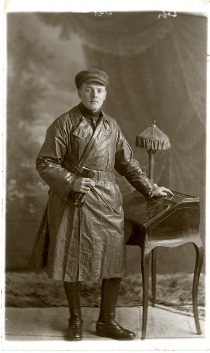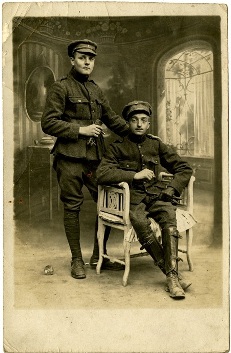Belgian Connections in the Monica Roberts Letters
Published on 4th April 2017
 The Monica Roberts Collection contains mainly letters she received from Irish Men fighting on the Western Front during World War 1. However two Belgian soldiers also correspond with Monica Roberts, writing in both French and English. Library Assistant, Finola Frawley has transcribed and translated these letters, and provides us with an insight in their remarkable subjects and contents.
The Monica Roberts Collection contains mainly letters she received from Irish Men fighting on the Western Front during World War 1. However two Belgian soldiers also correspond with Monica Roberts, writing in both French and English. Library Assistant, Finola Frawley has transcribed and translated these letters, and provides us with an insight in their remarkable subjects and contents.
Sepia photo of Freddy Berckmans (standing) & José Verachtert (seated). Ref: DCLA/RDFA.01.08.039A
Freddy Berckmans serving in D44 2/I of the Belgian Army and writes approximately 17 letters to Monica which span from May 1914 until 24 January 1918 . The letters are mainly written from the Belgian Front, though he was only 17 at the outbreak of World War 1 and was initially in training. His family and Monica Roberts’ know each other socially and he frequently refers to friends they have in common. He addresses her in the formal “vous” showing respectfulness. The tone is one of affection, humour and deep appreciation for presents she sends to him by post – butter scotch, air pillow, sardines, fountain pen, watch, (pen and watch were both later stolen), pipe & tobacco, writing paper, knife, electric light, inkstand, waterproof clothing, chocolates, cigarettes. A friend they have in common is a Mrs Conner who lives sometimes in Bradford, sometimes in London, and whose delicate health is often mentioned. Freddy’s mother, like Monica Roberts, sings and participates in concerts in aid of the war effort and this is also referred to.
 In one of his early letters, Freddy gives a breakdown of his 24-hour shift on guard duty, 4 x blocks of 6 hours: 2 hours’ guard followed by 4 hours’ rest from 5 p.m. to 5 p.m. the following day. He is also doing his telephonist exam in order to go to the Front hoping Monica will keep his confidence and not tell his mother. (31 May 1914, RDFA1.05.004)
In one of his early letters, Freddy gives a breakdown of his 24-hour shift on guard duty, 4 x blocks of 6 hours: 2 hours’ guard followed by 4 hours’ rest from 5 p.m. to 5 p.m. the following day. He is also doing his telephonist exam in order to go to the Front hoping Monica will keep his confidence and not tell his mother. (31 May 1914, RDFA1.05.004)
Studio Photo DCLA/RDFA1.09.018 of Freddy Berckmans sent to Monica Roberts. Ref. DCLA/RDFA1.09.018A (click to enlarge)
By late summer 1916 his battery of artillery using four ‘105’ cannons are almost ready to go to the Front & he is very gung-ho saying, “I am very happy to be going to the Front to defend our dear little Belgium… I will never forget my promise to you – the head of the Kaiser, sitting over the piano in your living room while I sing ‘Are we Downhearted? No!’” (21 July 1916 RDFA1.05.007) The Belgian and British battalions in the Somme area seem to hit it off quite well and Freddy makes frequent references to ‘the Tommies’, ‘We are much better off here [St. Quentin] than in Eu. The food is much better produced by the chefs of the Front who have come to meet us. They talk to us like friends and are very nice. We have been wearing khaki for one week now, just like the Tommys’ [translation]. (21 July 1916 RDFA1.05.007)
The learning and singing of English songs plays an important part in Private Berckmans’ leisure time, “I learned two more English songs. (Little gray home in the west) and another rag time” [30 October 1916 RDFA1.05.012] and ‘my friend [José Verachtert] shall be very pleased to get some news of you, we sing all our songs together, and he speak English very well” and ‘I should like to learn ‘Yacka Hula Hickey Dula’ [Hawaiian Love song written 1916] and ‘But you can do me a great pleasure in sending me the couplets of "Long, long trail" I got only the chorus, and I want to know it entirely’ [20 October 1917 RDFA1.05.015].
A letter written 24/01/1918 giving the address as 55 Upper Mount Street, Dublin with Freddy’s signature but written by fellow soldier & friend, José Verachtert shows the two soldiers’ much anticipated wish to visit Dublin when their next leave came through was fulfilled, ‘I shall of course pay you a visit when I am leaving Dublin I think next week anyway I shall write you the day I shall be able to do so’ [translation]. Interestingly the listing in Thom’s Street Directory for years 1917 & 1919 for that end of Upr Mount Street ran: Nos. 55-61, “Vacant”. No. 62, “Belgian Refugees’ House”.
The last we hear of Freddy is a reference to him in a letter written by José Verachtert to M.R., ‘‘Heard accidentally, Freddy's going soon for the Brigadier's examination. Hope he will succeed.’ [12/09/1918].
 José Verachtert wrote 30 letters to Monica Roberts between July 1917 and January 1919. Born in approximately 1894, Verachtert is a despatch rider in the Belgian army who has spent enough time in London to speak & write English quite well. His family business was destroyed when the German army bombarded Antwerp causing the death of his father. In one letter he gives a ‘small report from the past few days’ in order to give a glimpse into life of a solider. He describes vividly the destruction of a pretty Belgian village by German shelling from 17th to end of July 1917 with entries such as ‘July 28th. Afternoon Mighty bombardment during many hours with heavy shells; (one of them exploded four yards from the place where Freddy and I were working; we got a lot of ground etc. upon us. It was rather an very unpleasant feeling, to be buried alive!’ (29 July 1917 RDFA1.08.005)
José Verachtert wrote 30 letters to Monica Roberts between July 1917 and January 1919. Born in approximately 1894, Verachtert is a despatch rider in the Belgian army who has spent enough time in London to speak & write English quite well. His family business was destroyed when the German army bombarded Antwerp causing the death of his father. In one letter he gives a ‘small report from the past few days’ in order to give a glimpse into life of a solider. He describes vividly the destruction of a pretty Belgian village by German shelling from 17th to end of July 1917 with entries such as ‘July 28th. Afternoon Mighty bombardment during many hours with heavy shells; (one of them exploded four yards from the place where Freddy and I were working; we got a lot of ground etc. upon us. It was rather an very unpleasant feeling, to be buried alive!’ (29 July 1917 RDFA1.08.005)
Sepia photo of Freddy Berckmans (standing) & José Verachtert (seated). Ref: DCLA/RDFA.01.08.039A (click to enlarge)
He speaks a lot of the boredom of the trenches and suffers from depression, common to many soldiers on returning to the Front after being on Leave. He is also frequently worried about what he will do after the war and doesn’t want to be a burden to his widowed mother who is on the Germans’ watch list, she ‘is subjected to a special watch as they [the Germans] suspect her for having helped young men to join the army’. (19 October 1917 RDFA1.08.018)
22/11/1917, He gives a run-down of his daily routine, ‘After wake-up which is at 7 a.m. there's breakfast; work from 8 o'clock to 11.30; then rest and dinner. At one o'clock potato peeling. At 1.30 tea break. Work from 2 p.m. until 5 p.m. Supper & wash to freshen up. Then studies begin. Military classes, dry & tiring classes. I have already sat & passed the brigadier's exam and am preparing slowly for other exams’.
And speaking of his friend in the same letter, ‘Freddy & I have been meeting up quite a bit this past while. Thanks to him my mood is still up-beat. He is a very dear friend and I love him like a brother.’
In his last letter dated 31/01/1919 José says he is living in Anvers, but does not say if he has found a job. However he must have some means as he plans to go to London at the weekend.